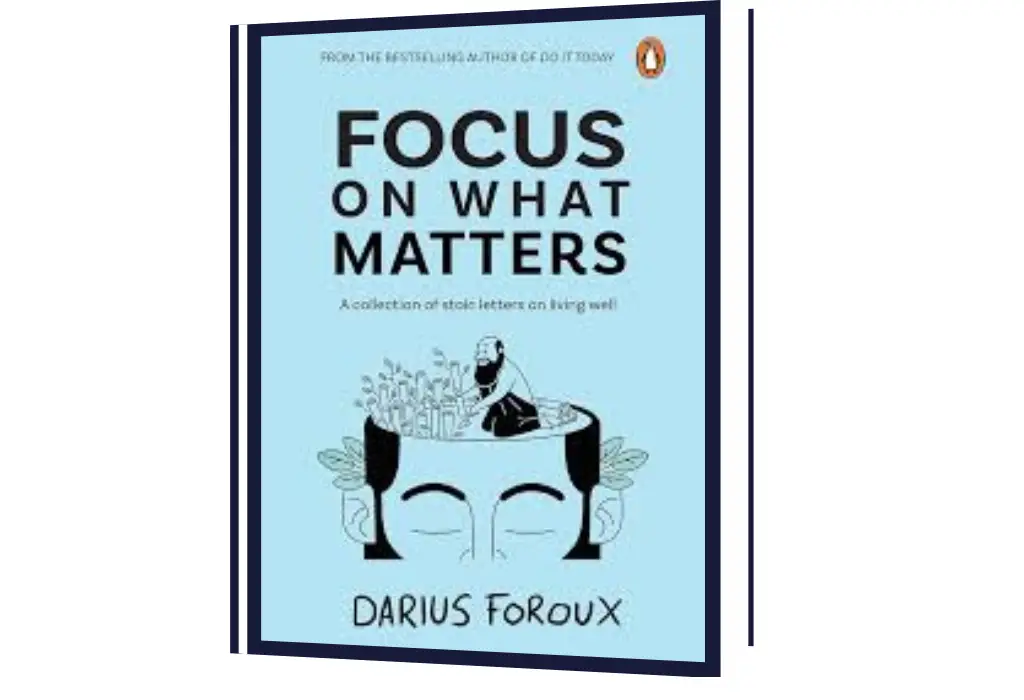Why is it so hard to live well amidst the chaos and noise? While you might think this is a problem of the modern world, it’s a timeless issue.2000 years ago, the ancient Stoics talked about the exact same challenges we’re facing today, like: How can we find inner peace?What does it take to be happy?Can we become more resilient?The answers can be found in the philosophy of Stoicism. I’ve used the philosophy since 2014 to change my life and career.
Focus on What Matters is a collection of 70 letters/essays I wrote about different aspects of life, from happiness, wealth, health to relationships and much more.
These letters, inspired by the original works of the Stoic philosopher Seneca, serve as reminders to focus on the right things in our chaotic lives.
The goal of the original “Letters From A Stoic” by Seneca was to share Stoic ideas with his friend, Lucilius, who had hedonistic tendencies and lived a busy life. Focus on What Matters is inspired by those letters. It will show you..Simple thought exercises to become resilient and focused. How to live in the present moment every day. Authentic Stoic values for a life of happiness A way to build more discipline In short, this book helps you to live well despite the challenges of daily life.
“Focus on What Matters: A Collection of Stoic Letters on Living Well” is a thought-provoking compilation of wisdom drawn from the teachings of ancient Stoic philosophers. The book presents an accessible interpretation of key Stoic ideas, designed to help modern readers navigate the complexities of life with greater clarity, purpose, and resilience. It delves into themes such as the importance of living virtuously, managing emotions, accepting the inevitability of suffering, and focusing on what truly matters.
Introduction to Stoicism
Stoicism is a philosophical school that emerged in Athens during the early 3rd century BCE. Founded by Zeno of Citium, the philosophy focuses on developing self-control, fortitude, and rationality as a way of overcoming destructive emotions and leading a life of virtue. The Stoics believed that virtue is the only true good and that external events are beyond our control; the only thing within our control is our response to these events.
The book “Focus on What Matters” draws primarily on the writings of three great Stoic philosophers: Seneca, Epictetus, and Marcus Aurelius. Through their letters and reflections, readers are introduced to timeless principles that can help them lead lives of purpose and tranquility.
Chapter 1: The Power of Perspective
One of the core tenets of Stoicism is the distinction between what is within our control and what is not. This first chapter emphasizes how crucial it is to understand this distinction and focus only on the things we can control—our thoughts, actions, and attitudes. By letting go of concerns about external circumstances, we can achieve peace of mind.
The letters included in this chapter reflect on how we often waste energy worrying about things outside our control, such as the opinions of others, material success, or unpredictable life events. Stoicism teaches that by shifting our focus to our inner life, we can cultivate resilience. This perspective allows individuals to remain calm in the face of adversity, disappointment, or even tragedy.
One famous example comes from Epictetus, who argues that events are not inherently good or bad—it’s our judgment of them that causes distress. He advises that by viewing life’s challenges as opportunities for growth, we can maintain a balanced emotional state and make wiser decisions.
Chapter 2: Virtue as the Ultimate Good
The second chapter delves into the Stoic belief that virtue—specifically, the cultivation of wisdom, courage, justice, and temperance—is the only true good. Unlike external goods like wealth, fame, or pleasure, which are fleeting and often beyond our control, virtue is something we can develop through deliberate practice.
Seneca’s letters are particularly illuminating on this topic. He writes about the importance of internal integrity, suggesting that living in accordance with one’s principles is the key to happiness. For Seneca, virtue is not something we simply “achieve”; it’s a lifelong process of aligning our actions with our values.
The chapter also explores the idea that virtues must be practiced, especially in difficult circumstances. It is easy to act justly when things are going well, but the true test of one’s character comes when facing hardship. This idea is reflected in Marcus Aurelius’ “Meditations,” where he consistently reminds himself that no matter what obstacles he encounters, it is within his power to respond with patience, kindness, and dignity.
Chapter 3: Managing Emotions
Stoicism is often misunderstood as advocating for the suppression of emotions. In reality, Stoics don’t suggest eliminating emotions entirely but managing them in a way that they don’t control us. This chapter focuses on emotional resilience, explaining how Stoic techniques can help individuals deal with anger, fear, sadness, and other disruptive emotions.
Seneca, for example, writes extensively about anger. He describes it as a temporary madness that distorts our judgment and leads to irrational behavior. Through self-reflection and practice, Stoics argue that we can develop the ability to pause before reacting, allowing us to respond with reason rather than emotion.
Another crucial aspect discussed in this chapter is fear—particularly the fear of death. Epictetus reminds us that death is a natural part of life and that fearing it is irrational. He encourages readers to view death not as something to dread but as something to accept with calmness and equanimity.
Chapter 4: Accepting the Nature of Suffering
Stoicism teaches that suffering is an inevitable part of life. Rather than attempting to avoid suffering at all costs, the Stoics advocate for accepting it as part of the human experience. This chapter compiles letters and reflections that encourage readers to embrace suffering as a means of building strength and resilience.
One of the key concepts here is the idea of “amor fati,” or love of fate. The Stoics believed that everything happens for a reason, even if we cannot always understand it in the moment. By embracing fate and accepting the challenges life presents, we can move through suffering with grace rather than resistance.
Marcus Aurelius’ writings are full of reminders to himself that suffering is not only inevitable but necessary for growth. He often reflects on how challenges force us to confront our weaknesses and develop greater fortitude. By facing pain, loss, or failure head-on, we become more equipped to deal with future adversities.
Chapter 5: Living in the Present
A recurring theme in Stoic philosophy is the importance of living in the present moment. Many of the letters in this collection remind readers that worrying about the past or future is futile because both are outside our control. All we truly have is the present, and we should strive to make the most of it.
Seneca, in particular, writes eloquently about the dangers of procrastination and wasting time. He warns that people often live as if they have unlimited time, postponing important actions or decisions until later. However, life is unpredictable, and we never know how much time we have left. The Stoics urge us to live each day as if it were our last, not in a hedonistic sense but with a focus on what truly matters.
This chapter also emphasizes mindfulness—a concept that aligns closely with Stoic teachings. By being fully present in our daily activities, we can experience life more deeply and with greater appreciation.
Chapter 6: The Value of Simplicity
In today’s fast-paced, consumer-driven world, Stoicism offers a refreshing reminder of the value of simplicity. This chapter focuses on the Stoic practice of “voluntary discomfort” and the idea that happiness does not come from material possessions but from living in accordance with nature.
Epictetus advises readers to practice living with less in order to cultivate contentment. By periodically abstaining from luxury or convenience, we can strengthen our resilience and remind ourselves that we don’t need external things to be happy. The Stoics believed that true wealth comes not from accumulating more but from needing less.
Seneca also reflects on the importance of living a simple life. He encourages readers to focus on personal growth and self-improvement rather than the pursuit of status or wealth. For the Stoics, a simple life is not one of deprivation but of abundance—an abundance of time, energy, and attention for the things that truly matter.
Chapter 7: Relationships and Community
Although Stoicism is often associated with individualism, the philosophy also places a high value on relationships and community. This chapter explores the Stoic belief that we are all interconnected and that we have a duty to contribute to the greater good.
Marcus Aurelius writes about the importance of treating others with kindness and understanding, even when they wrong us. He reminds himself that other people’s actions are often influenced by ignorance or fear, and we should respond with compassion rather than anger.
Seneca, too, emphasizes the value of friendship and mutual support. He advises readers to surround themselves with virtuous people who will challenge them to grow and improve. For the Stoics, relationships are not about what we can gain from others but about how we can support and uplift one another in the pursuit of virtue.
Chapter 8: The Stoic Approach to Success
In today’s world, success is often measured in terms of wealth, fame, or power. However, Stoicism offers a radically different perspective on what it means to be successful. This chapter contrasts the Stoic approach to success with modern notions of achievement.
For the Stoics, success is not about external rewards but about living in alignment with one’s values. Epictetus warns against chasing after wealth or recognition, as these are fleeting and ultimately outside our control. Instead, true success comes from living virtuously and fulfilling our potential as human beings.
Marcus Aurelius reflects on the transient nature of worldly success. He reminds himself that fame and fortune are temporary, and that the only lasting legacy is the impact we have on others through our actions. The Stoic ideal of success is one of quiet excellence—doing the right thing, even when no one is watching.
Chapter 9: Death and Legacy
The final chapter of the book addresses one of the most profound aspects of human existence: death. The Stoics believed that by contemplating death regularly, we can overcome our fear of it and live more fully. This chapter compiles letters that encourage readers to accept death as a natural part of life and to focus on what they will leave behind.
Seneca’s letters offer a comforting perspective on mortality. He writes that death should not be feared, as it is simply the end of a journey that everyone must take. By living virtuously, we can ensure that we leave behind a legacy of goodness, even if our physical presence is gone.
Marcus Aurelius echoes this sentiment in his “Meditations,” where he reflects on the shortness of life and the importance of making the most of each moment. He encourages readers to live in a way that honors their principles, knowing that their actions will continue to impact the world long after they are gone.
Conclusion
“Focus on What Matters: A Collection of Stoic Letters on Living Well” serves as both a guidebook and a source of inspiration for anyone seeking to live a more meaningful and fulfilling life. By drawing on the timeless







